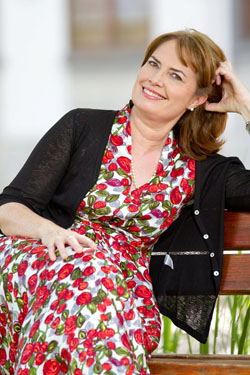
Prof Naomi Morgan |
Prof Naomi Morgan, lecturer at the UFS Department of Afrikaans and Dutch; German and French, received the prestigious Chevalier de l’Ordre des Arts et des Lettres award at the French Embassy in Pretoria on Monday 26 January 2015.
The Ordre des Arts et des Lettres (Order of Arts and Letters) is an Order of France, established on 2 May 1957 by the Minister of Culture, and its supplementary status to the Ordre national du Mérite was confirmed by President Charles de Gaulle in 1963. Its purpose is the recognition of significant contributions to the arts, literature, or the propagation of these fields.
Prof Morgan is being recognised for her translation work of plays such as ‘Oskar en die Pienk Tannies’, as well as translations of Afrikaans songs to French for the popular Afri-Frans compilation. The fact that the French Government gives such a highly-acclaimed award in recognition to the ‘art of translation’ is even more of an overwhelming honour to her than the personal achievement in itself.
The Chevalier (the Knighting) awarded to Prof Morgan is the third highest grade in the Order.
Prof Morgan now joins world-renowned individuals such as William Kentridge and Johnny Clegg on the list of foreign luminaries who have received this honour. Only two Literature Professors from South Africa – JM Coetzee and André P Brink – received this award in the past. During 1992, Brink received a Commandeur de l’Ordre des Arts et des Lettres and Coetzee was awarded the Chevalier de l’Ordre des Arts et des Lettres.
“I feel that an award like this is not only significant for me, but also to students who are busy with their studies and wondering: is there going to be recognition, what can one do with translation?” Prof Morgan said. “This is the biggest gift, the biggest gift anyone could ever give me. Now I ask for nothing more!”
For more information or enquiries contact news@ufs.ac.za .